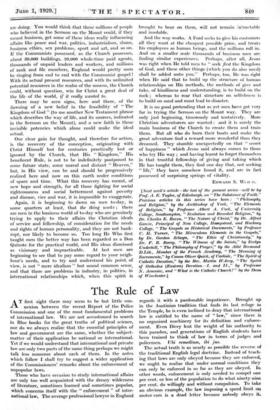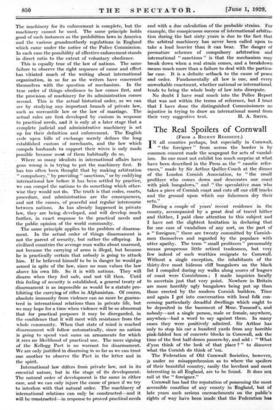The Rule of Law
AT first sight there may seem to be but little con- nexion between the recent Report of the Police Commission and one of the most fundamental problems of international law. We are not accustomed to search in Blue books for the great truths of political science, nor do we always realize that the essential principles of law and government are the same, whether the subject- matter of their application be national or international. Yet if we would understand that international and private law are only two parts of the same thing perhaps we might talk less nonsense about each of them. In the notes which follow I shall try to suggest a wider application of the Commissioners' remarks about the enforcement of unpopular laws.
Those who have occasion to study international affairs are only too well acquainted with the dreary wilderness of literature, sometimes learned and sometimes popular, which concerns itself with the " enforcement " of inter- national law, The average -professional lawyer in England regards it with a pardonable impatience. Brought up in the Austinian tradition that finds its last refuge in the Temple, he is even inclined to deny that international law is entitled to the name of "law," since there is no organized machinery for its definition and enforce- ment. Even Dicey lent the weight of his authority to this paradox, and generations of English students have been trained to think of law in terms of judges and policemen. Ubi rentedium, ibi jus.
The actual truth is as nearly as possible the reverse of the traditional English legal doctrine. Instead of teach- ing that laws are only obeyed because they are enforced, we ought to realize that under normal conditions they can only be enforced in so far as they are obeyed. In other words, enforcement is only needed to compel one per cent. or less of the population to do what ninety-nine per cent. do willingly and without compulsion. To take an obvious example, the law imposing a speed limit on motor cars is a dead letter because nobody obeys it. The machinery for its enforcement is complete, but the machinery cannot be used. The same- principle holds good of such instances as the prohibition laws in America and the various grandmotherly regulations in England which came under the notice of the Police Commission. In each case the possibility of effective enforcement stands in direct ratio to the extent of voluntary obedience.
This is equally true of the law of nations. The same failure to observe the right sequence of cause and effect • has vitiated much of the writing about international organization, in so far as the writers have concerned themselves with the. question of mechanism. In the true order of things- obedience to law comes first, and the provision of machinery for its administration comes second. This is the actual historical order, as we can see by studying any. important .branch of private law, such as mercantile law or the law of marriage. The actual rules are first developed by custom in response to practical needs, and it is only at a later stage that a _complete judicial and administrative machinery is set up for their ,definition and enforcement. , The English code upon bills of exchange merely defines the long. established custom of merchants, and the law which compels husbands to support their wives is only made possible because most of them habitually do so.
Where so many idealists in international affairs have gone wrong. is in trying to put_ the machinery -first. It has too often been tlought that by making arbitration " compulsory," by providing" sanctions," or.by codifying international law before it hasbeen settled by practice,- we can compel the nations to do something which other- Wise they would not -do. The trirth is that codes, courts, procedure, and administration are the consequences, and not the Causes,-- of peaceful and regular intercourse between nations. As has already happened in private law, they are being., developed, and will develop much further, in exact response to the practical needs and the public opinion of the world community. - The same principle applies to the problem of disarma- ment. In the actual order of things disarmament is not the parent of security, but rather the offspring. In civilized countries the average man walks about unarmed, not because. the carrying of arms is illegal, but because he is practically certain that nobody is going to attack him. If he believed himself to be in danger he would go armed in spite of the law, since no man values the law above his own life. So it is with _nations. They will disarm when they feel safe, and not till then. Until this feeling of security is established, a general treaty of disarmament is as impossible as would be a statute pro- hibiting the carrying of rifles in Afghanistan. Of course, absolute immunity from violence can no more be guaran- teed in international relations than in private life, but we may hope for a time when violence will be so abnormal- that for practical_ purposes it may be disregarded, in the confidence that it will meet with resistance from the 'n hole community. When that state of mind is reached disarmament will follow automatically, since no nation is going to spend vast sums on armaments for which it sees no likelihood of practical use. The mere signing of the Kellogg Pact is no warrant for disarmament. We are only justified in disarming in so far as we can trust one another to observe the Pact in the letter and in the spirit.
• International law differs froni private law, not in its essential nature, but in the stage of its development: The natural order of development is the same in either case, and we can only injure the Cause of peace if we try to interfere with that natural order. The machinery of international relations can only he constructed—and it will be construeted—in response to proved practical needs and with a due calculation of the probable strains. For example, the-eonspicuous success of international arbitia- tien during the last sixty years is due to the fact that . the arbitral machinery has never' been called upOn to take a load heavier than it can bear. The danger of premature schemes of compulsory arbitration and international " sanctions " is that the mechanism may break down when a real strain comes, and a breakdown means much more than a failure to deal with the particu- lar case. It is a definite setback to the cause of peace and order. Fundamentally all law is one, and every unworkable enactment, whether national or international, tends to bring the whole body of law -into disrepute.
No doubt I have read much into the Police Report that was not within the terms of reference, but I trust that I have done the distinguished Commissioners no injustice in trying to draw an international moral from











































 Previous page
Previous page